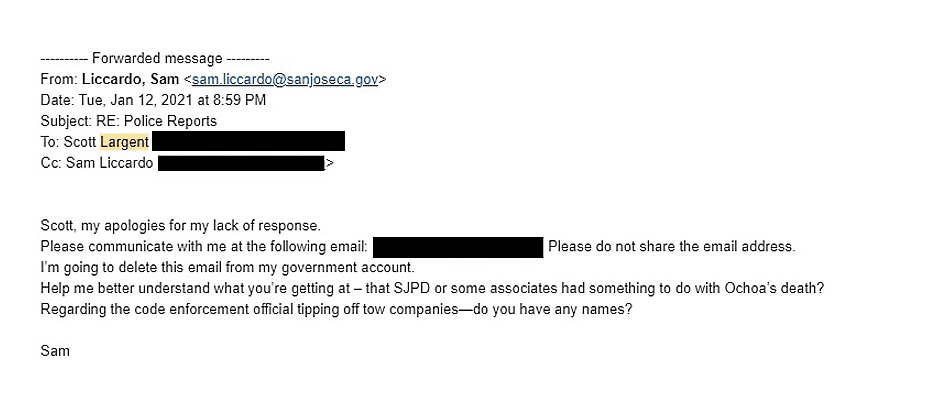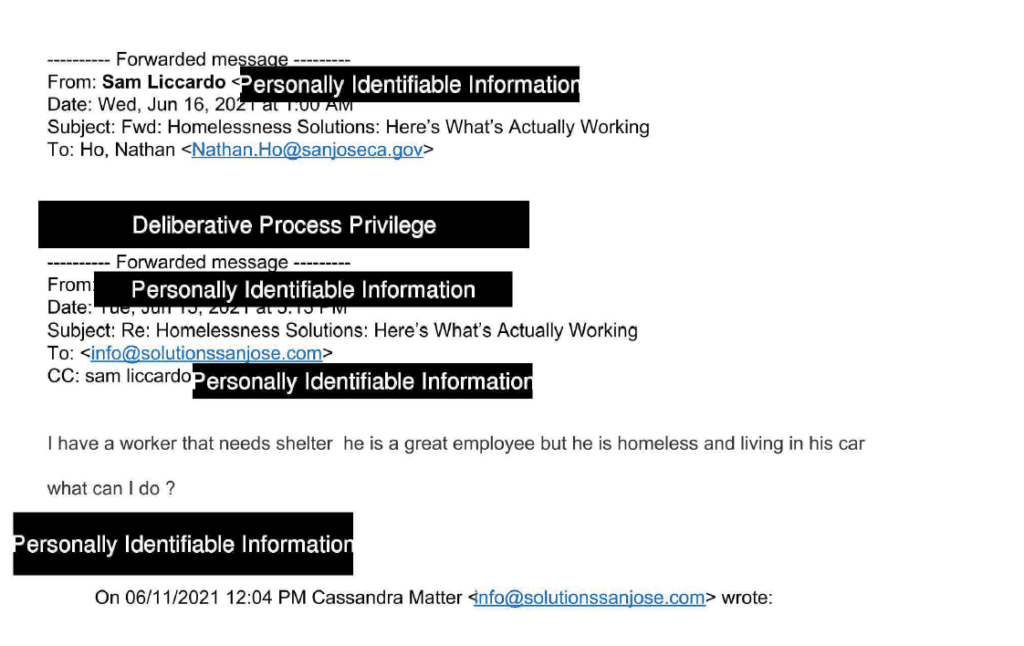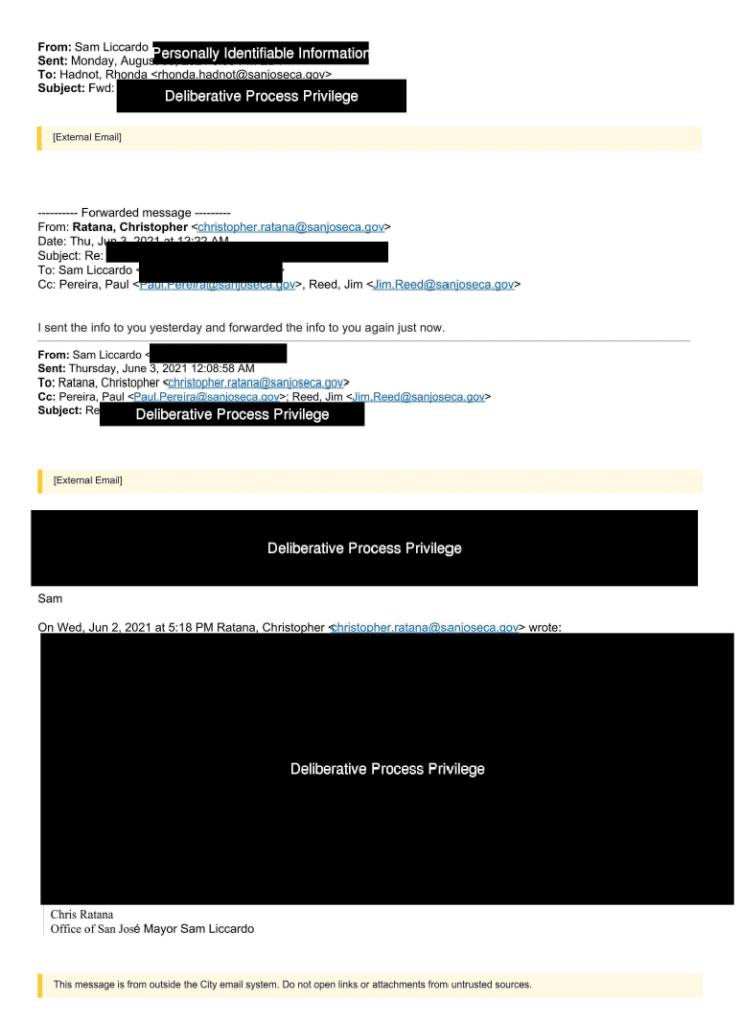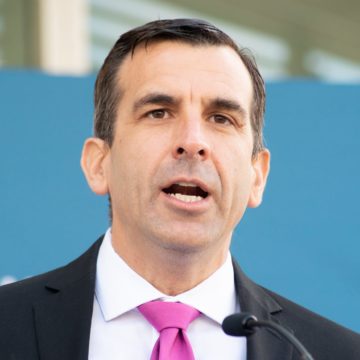San Jose Mayor Sam Liccardo routinely uses his private email account to discuss city matters, communicate with local nonprofits and strategize with lobbyists, a San José Spotlight analysis of his recent emails found.
One email thread also shows how Liccardo potentially mixes city resources with his nonprofit Solutions San Jose— an advocacy organization formed earlier this year. The city sees no concerns with using public resources on a private non-city entity.
A trove of private emails released to San José Spotlight this month shed light on how much the mayor relies on his Gmail address to conduct city business—and how well-accepted his use of a private account is among city officials. San José Spotlight, represented by attorney Karl Olson, demanded the mayor’s private emails after it exclusively revealed how Liccardo used his private email to skirt public records laws, vowed to delete a public email thread and encouraged resident Scott Largent to privately email him on a city matter.
The city released nearly 1,600 pages of records from June and July — all linked to Liccardo’s private Gmail account. The records show Liccardo sends and receives hundreds of emails related to city business through his Gmail account each month.
“This is my direct email address, which I read three or four times a week,” Liccardo wrote a San Jose resident who expressed frustration with VTA leadership on June 23.
Public work, private emails
Why does the mayor use a private email address to conduct the public’s business, raising questions about transparency? Liccardo says the city’s email system doesn’t work.
“There are a lot of challenges in using the (Microsoft) Outlook platform, particularly remotely,” Liccardo told San José Spotlight, citing emails that get stuck in his outbox, syncing issues and slow service. “Running the 10th largest city in America requires communication that actually works… I have to ensure that people actually receive emails and I’m able to receive their emails.”
The mayor has faced scrutiny—and a Supreme Court case in 2017—over his use of a private email account. Using a private email to conduct city business is not illegal, but storing communications on private servers could open city officials up to potential California Public Records Act violations, First Amendment Coalition attorney Glen Smith said. And Liccardo has failed to turn over private emails that should be public record—initially saying none existed between himself and Largent.
“The danger comes when, in response to a Public Records Act (request), the city treats (private emails) separately,” Smith said. “If the city employees who are supposed to respond to Public Records Act requests are unaware of the existence of the account, (those emails) never get checked.”
This exact problem came to light in July when San José Spotlight discovered the mayor failed to disclose his private emails with Largent in response to a records request. He deleted the conversation from his city account, the emails show.

“There’s no public records act violation,” Liccardo told San José Spotlight. “Our city attorney has been very clear on this question.”
Solutions San Jose
This news organization’s review of Liccardo’s private emails is now raising questions about whether the mayor uses the city’s time and resources on his secretive advocacy group, Solutions San Jose.
The mayor quietly formed Solutions San Jose in February—an advocacy group that sets out to lobby and shape public policy. He serves as secretary, according to the organization’s registration form. The organization has heavily lobbied on city-related matters, including water rate hikes, housing policy and reopening public schools.
When San José Spotlight requested emails related to the advocacy group, it received a blanket denial—the city claimed only three emails existed and that they were subject to attorney-client privilege after this news organization appealed the decision.
But on June 15, a resident emailed Solutions San Jose seeking shelter for his employee. The resident copied Liccardo’s private email address.
There’s no record of Liccardo responding. Instead, the mayor forwarded the inquiry to Nathan Ho, a staff member in his office. The city redacted the email, citing “deliberative process privilege.”

Deliberative process privilege protects communications that would expose an agency’s decision-making process and is often applied to contracts or collective bargaining, said Sean McMorris, policy consultant to watchdog group California Common Cause.
“If he’s just forwarding the email to a city employee who has access to resources that can help this person, there’s nothing wrong with that,” McMorris said. “But if he was attempting to utilize the city in a manner that would benefit his nonprofit in some way, there might be some concerns.”
Liccardo referred questions about the Solutions San Jose email to the city attorney’s response.
A city attorney said it’s not a violation to use city resources on the mayor’s private nonprofit. The issue in the email “may come before council” and should not be publicly disclosed, deputy city attorney Arlene Silva said.
“A constituent reached out to the mayor seeking assistance regarding sheltering a homeless employee in San Jose,” Silva said. “Housing and homelessness within the city of San Jose is city business and currently a City Council priority.”

Heavy redaction
A large chunk of the 1,600 pages of records released to San José Spotlight are blacked out—making it difficult to gauge what the discussions on public matters entailed.
The city cited deliberative process privilege about 100 times to redact discussions on housing, homelessness and the city’s budget. It also redacted personal information like private email addresses, phone numbers and names more than 200 times.
The city heavily redacted discussions about new emergency housing sites and potential funding to troubled nonprofit Downtown Streets Team, citing broad exemptions to the public records law. In some cases, the city even redacted the subject line. It also withheld some emails it claims are private to Liccardo and have nothing to do with city business.
Silva defended the redactions.
“Disclosure would chill the candid discussions and flow of information needed for optimum decision making and policy consideration matters inside the mayor’s office,” she told San José Spotlight.
A common practice
The mayor still uses his government email account, chief of staff Jim Reed said. But Liccardo leans on his private email to get business done.
Liccardo’s senior advisors including Kelly Kline, Scott Green, Nathan Ho and assistant Isela Chaparro often directly—and only—emailed the mayor’s private Gmail account to keep him updated on city business, records show.
Other city officials, including City Attorney Nora Frimann, Police Chief Anthony Mata, Deputy City Manager Lee Wilcox and Director of Economic Development Nanci Klein, also communicated using the mayor’s private account in June and July. Even Google’s executives emailed Liccardo on his private account as the tech giant looks to build a massive campus in downtown San Jose.
Liccardo also used his Gmail address to communicate with White House officials in July and to contact the state’s Department of Justice for help on his gun control initiative, records show.
Whether this raises concerns about cybersecurity, the city won’t say.
“The IT department does not monitor private accounts, and therefore the city cannot comment on this question,” Silva said.
Emails show the mayor often works with Cruz Strategies as well as lobbyist Leslie Pollner—whose clients include the city of San Jose and Alphabet, the parent company of Google—and PR guru Stephanie Craig who was awarded six-figure public contracts to boost Liccardo’s profile with national media.
As the mayor continues to use his private account, McMorris said the public will rightfully question whether he is complying with the law.
“It’s up to him whether he wants to continue to have the public scrutinize why he’s using his private account and not his city account,” McMorris said. “Regardless of whether there’s anything scandalous in there, the fact that he’s using his personal email account as much as he is to conduct city business is a story in and of itself.”





